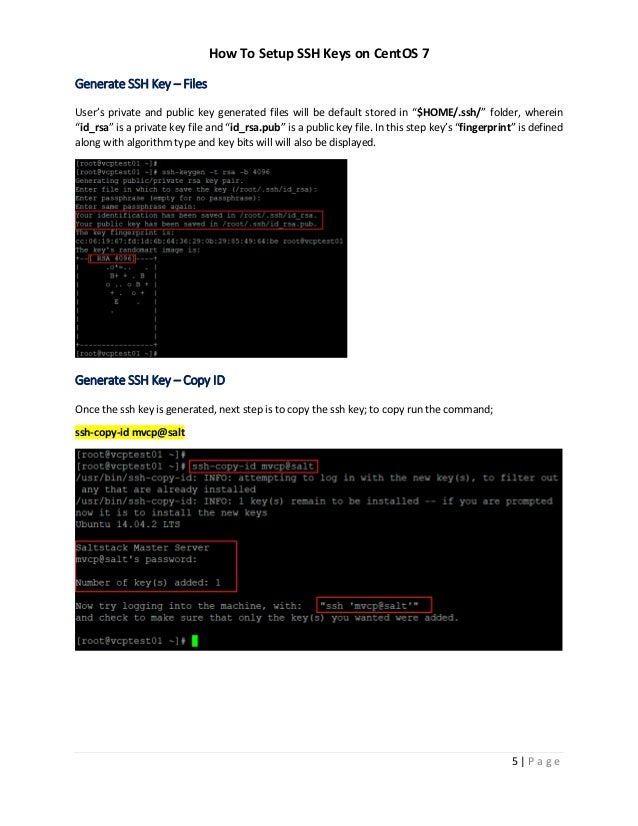Generate New Ssh Key Centos
- Ssh On Centos
- Generate Ssh Key Centos 8
- Generate New Ssh Key Centos Server
- Ssh Key Github
- Generate Ssh Key Centos
Oct 14, 2019 Today I'm generating myself a new ed25519 SSH keypair. Generating ed25519 SSH Key. I'm hoping to reinstall my MacBook Pro 15' 2017 with a fresh macOS Catalina sometime soon, and part of preparations is testing my install methods (hello, brew!) and configuration files migration. SSH allows the use of encryption keys to be used to allow logging into a system instead of having to remember a plain text password. This is great for use in scripts, and automated tasks, but can be a problem is anyone else ever gets the keys somehow. If the keys become compromised, you must generate new SSH keys. Dec 18, 2019 In this tutorial, we will walk through how to generate SSH keys on Ubuntu 18.04 machines. We will also show you how to set up an SSH key-based authentication and connect to your remote Linux servers without entering a password. How to regenerate new ssh server keys This is an unusual topic since most distribution create these keys for you during the installation of the OpenSSH server package. But it may be useful to be able generate new server keys from time to time, this happen to me when I duplicate Virtual Private Server which contains an installed ssh package. Apr 12, 2018 SSH-key-based authentication provides a more secure alternative to password-based authentication. In this tutorial we'll learn how to set up SSH-key-based authentication on a CentOS 7 installation. Jan 31, 2012 Cannot generate ssh keys with keygen (SELinux problem?) Post by nikkilocke » Mon Jan 30, 2012 4:00 pm I'm trying to resist the temptation to disable SELinux on my new CentOs 6 install.
I'm trying to resist the temptation to disable SELinux on my new CentOs 6 install. I don't really understand how it works, or what it is for, but I like the idea of having better security.I am logged in (via ssh) to the box, as user 'yum'.
I am in my home directory, /home/yum
I type ssh-keygen, and the following dialog ensues:
[yum@centos6dev ~]$ ssh-keygen
Generating public/private rsa key pair.
Enter file in which to save the key (/home/yum/.ssh/id_rsa):
 Could not create directory '/home/yum/.ssh'.
Could not create directory '/home/yum/.ssh'.Enter passphrase (empty for no passphrase):
Enter same passphrase again:
open /home/yum/.ssh/id_rsa failed: Permission denied.
Saving the key failed: /home/yum/.ssh/id_rsa.
[yum@centos6dev ~]$ ls -ld . .ssh
drwx------. 10 yum yum 4096 Jan 30 15:40 .
Ssh On Centos
drwx------. 2 yum yum 4096 Jan 25 18:27 .ssh[yum@centos6dev ~]$ ls -l .ssh
total 8
-rw-------. 1 yum yum 3852 Jan 25 18:27 authorized_keys
-rw-------. 1 yum yum 862 Jan 30 15:49 known_hosts
Generate Ssh Key Centos 8
What's wrong?This is an unusual topic since most distribution create these keys for you during the installation of the OpenSSH server package. But it may be useful to be able generate new server keys from time to time, this happen to me when I duplicate Virtual Private Server which contains an installed ssh package.
OpenSSH require different keys depending if you use SSH1 and/or SSH2 protocol. All keys are generated by ssh-keygen, that one should be available on your system with the ssh package. The receipt is almost the same as for generating your own keys, except that you should use an empty passphrase. Default key lengths are also appropriate (2048 bits for rsa and 1024 bits for dsa)
Generate New Ssh Key Centos Server
SSH1 protocol
For SSH1 protocol, you need a rsa1 key generated has follow:
Ssh Key Github
SSH2 protocol
For SSH2 protocol, you need two keys, one RSA key and one DSA key generated has follow:
Generate Ssh Key Centos
Product key generator adobe 9. Since January 2011, OpenSSH also support ECDSA key, you may generate a new one using: